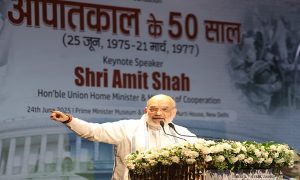As India is valiantly fighting against Corona, the economy keeps sliding down with every day of the lockdown. It in turn adds more to the burden / liability of the GOI. It is high time we look for various avenues to augment revenues. Do we have one? Yes, but not one but three! And, all the three are in the domain of Direct Taxes i.e. Income Tax.
These avenues are special in the sense that none of the proposed measures would in any way affect the common man. There has been a growing apprehension whether founded or not in the minds of the general public that ‘bitter pills’ are prescribed only for tem and the affluent ones are given loads of ‘sweets’ and kept in good humour.
A few months ago, the Finance Ministry reduced the rate of Corporate Tax from 30% to20%. We had questioned the move and expressed our reservations over the obviously ill-conceived idea. The Ministry had justified its stand on the ground that it would pave way for more amount of re-investments by the companies benefitted by the tax cut and this would help generate employment opportunities.
During the past few weeks, citing the Corona attack, companies have resorted to de-staffing, pay cut, withdrawal of allowances etc which might be justifiable to a certain extent. But these measures go against what was originally presumed at the time of reducing the tax rate. If the corporate sector is in trouble, GOI is in a quagmire much deeper, constantly under pressure to deliver.
As we know pretty well, tax is not a charge against profit; but is an apportionment / appropriation of profit. So logically, whether it is 20% or 30%, it would not seriously affect the business in any way. It means that where the companies do not have profits, naturally tax liability would not arise too. Hence any revision in the tax rates would have not have an adverse impact on the normal functioning of these establishments.
GOI would be helping itself by rolling back the corporate tax to 30% that would fetch more than Rs one lakh crore to the exchequer that should be a great relief in these times of crisis. (Owing to Corona related lock down, I have reduced the revenue benefit from 1.45 lacs to 1 lac)
The amount of corporate tax collected in a year comes to around 4 lakh crores (@20%) This may go beyond 5 lakh crores in the event of the rate being revised to 30%. A country with a population of 130 billion, as the fourth largest economy of the world, the amount of 5 lakh crores as corporate tax for a year is ridiculously low.
Why do the corporate houses in India strike a meager profit year after year? Is it real or is it being manipulated to escape tax? Both are correct with the latter one being more correct.
Ordinarily, the gap between the Gross profit and the Net profit is very huge. Indirect expenses take a heavy toll drastically reducing the profits to a level very dingy. Profit and Loss Account of an Indian corporate house is the real villain working against the interest of the revenue to the government. Here too, it is NOT the salaries or the perks and allowances that play the spoil sport. It is something else; it is – Depreciation!
For the purposes of Income Tax, we have the system of block of assets in place with different rates on written down value of the assets. It is but a common practice that depreciation is allowed against the normal wear and tear of the assets. As the assets tend to worn out by passage of time or by its use, they tend to lose their value and the resulting losses have to be brought into account as allowable expenditure. It is perfect.
The depreciation on the capital assets is adjusted against the revenue profits that would be available for taxation. It is allowed for deduction in a good spirit as more of capital assets helps in the expansion of the business. Hence, the intention is not faulty but the practice is.
Most of the corporate houses, either through their own reserves/ resources or by way of borrowings keep accumulating capital assets whether or not they are needed. This practice is surely legitimate one and is very much permissible under the Act. But the problem is with depreciation that effectively reduces the profit and saves Income Tax.
The tragic irony is that companies can claim the interest paid on these borrowings and also can claim depreciation which means that they enjoy ‘double bonus’ against the otherwise payable Income Tax.
The modus operandi is so clear. Corporate houses resort to vast accumulation of assets, claim depreciation, arrive at losses thereby escape tax and also justify their pay cuts and de-staffing.
It is high time a ceiling is fixed for the claim of depreciation proportionate to the amount of Gross Profit. Anything above a prescribed percentage of G.P. should be disallowed. This would result in a definite profit contributing in turn a much higher amount of Income Tax.
Another interesting aspect to note here is that the items in Manufacturing / Trading account do not have much scope of being manipulated as they are strongly supported by bills / vouchers. The Indirect Expenses shown in P&L account lend ample scope for misrepresentation and therefore reduction in the rate or ceiling of the amount in the case of depreciation is one sure way of bringing the real profits to tax.
Apart from the reduction in the rates, there is another point too to make note of. As many industrial houses remain closed because of lockdown, their effective work days have considerably come down. Taking into consideration the period of non-operation, depreciation for this period may be disallowed. Government may issue a direction to this effect. By doing this, there could be a considerable rise in the corporate tax for the year.
Let us move on to other two areas where the GOI has so much to do. Here the stakes are too high yet any move in the direction of our suggestion would be for sure strongly resisted by vested interests in every block cutting across political divides. But if the GOI could still go ahead with carrying out the suggestion, it would really mean a sort of economic revolution in India.
Here they are…
(to continue

- Baskaran Krishnamurthy. Writer, Columnist & Income Tax
- [email protected] , Twitter @Baskaranitax




























 WhatsApp us
WhatsApp us